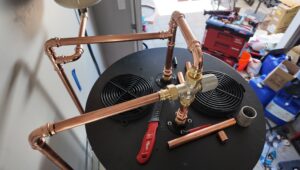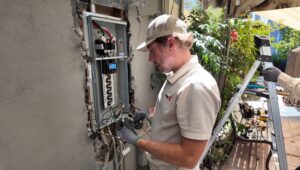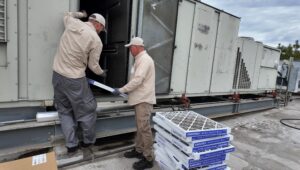 As the mercury rises and summer’s warmth embraces us, it’s really tempting to crank up the air conditioning, plug in fans, and power up all possible devices to stay cool. However, this increased usage of electrical appliances also increases the risk of electrical accidents. We have already told you how to maintain air quality in the heat of summer, and now here are some electrical safety tips.
As the mercury rises and summer’s warmth embraces us, it’s really tempting to crank up the air conditioning, plug in fans, and power up all possible devices to stay cool. However, this increased usage of electrical appliances also increases the risk of electrical accidents. We have already told you how to maintain air quality in the heat of summer, and now here are some electrical safety tips.
Keep an Eye on Your Air Conditioning Units
Regular Maintenance
Air conditioners work overtime during the summer, so it’s important to make sure they are in good working condition. Schedule regular maintenance checks, clean or replace filters, and ensure the outdoor unit is free from obstructions. Regular maintenance not only boosts efficiency but also prolongs the life of the unit that will serve you well throughout this hot season and others to come.
Proper Installation
If you’re installing a new air conditioner, make sure it’s done by a licensed professional. Improper installation can lead to electrical malfunctions and even fires. It’s also essential to ensure that the unit is properly grounded and that the wiring is up to code to prevent any potential hazards.
Avoid Overloading
Never plug your air conditioner into an extension cord or power strip. These devices are not designed to handle the high current flow required by air conditioners and can overheat, causing a fire. Always plug your air conditioner directly into a wall outlet.
Avoid Overloading Circuits
Understand Circuit Limits
Each circuit in your home can only handle a specific electrical load. Overloading a circuit by plugging in too many devices can cause overheating and potentially lead to a fire. It’s important to understand the capacity of your home’s electrical system and distribute the load evenly to avoid overloading.
Use Power Strips Wisely
Power strips can be handy, but they aren’t a solution for overloading. Use them sparingly and avoid connecting high-wattage appliances like air conditioners and refrigerators to power strips. Instead, use dedicated outlets for these heavy-duty appliances to ensure they receive the power they need without compromising safety.
Monitor Electrical Usage
Keep an eye on your electrical usage, especially during peak hot. High electricity consumption can strain your home’s electrical system. If you notice frequent tripping of circuit breakers or flickering lights, it may be a sign that your system is overloaded, and you should consult a professional electrician.
Stay Safe Outdoors
Be Cautious with Extension Cords
When using extension cords outdoors, ensure they are okay for outdoor use. Indoor extension cords are not designed to withstand the elements and can deteriorate quickly which can cause electrical hazards.
Check for Damaged Cords
Before using any electrical cords, inspect them for signs of wear and tear. Frayed or damaged cords should be replaced immediately! Never attempt to repair a damaged cord with electrical tape or other makeshift solutions; it’s safer to replace it entirely.
Use Ground Fault Circuit Interrupters (GFCIs)
GFCIs are essential for outdoor electrical safety. They are designed to protect against electrical shock by shutting off power if a ground fault is detected. Ensure that all outdoor outlets are equipped with GFCIs, especially those near pools, hot tubs, or other water sources.
Water and Electricity Don’t Mix
Pool and Hot Tub Safety
Ensure all electrical equipment near pools and hot tubs is properly grounded. Use only weatherproof electrical devices and keep them at a safe distance from the water to avoid any chance of electrical shock. Additionally, make sure all pool-related electrical systems are installed and inspected by a professional.
Dry Your Hands
Always dry your hands thoroughly before touching any electrical appliances, especially when you’re near water. Wet hands can make you a better conductor of electricity, increasing the risk of a shock. This simple habit can prevent serious accidents.
Avoid Using Electrical Devices Near Water
Refrain from using electrical devices like radios, phones, or tablets near pools or other water bodies. If these devices come into contact with water, they can pose a severe shock hazard. Instead, opt for battery-operated or waterproof versions of these devices for safe use near water.
Emergency Preparedness
Know Where the Circuit Breaker Is
In case of an emergency, it’s essential to know the location of your circuit breaker. Teach all family members how to turn off the power in case of an electrical fire or shock. Quick action can prevent further damage and ensure everyone’s safety.
Have a Fire Extinguisher Handy
Ensure you have a fire extinguisher that is rated for electrical fires (Class C). Knowing how to use it can prevent a small incident from becoming a disaster. Place the fire extinguisher in a readily accessible location and make sure everyone in the household knows how to operate it.
Develop an Emergency Plan
Create an emergency plan that includes evacuation routes and meeting points in case of a fire or other emergency. Regularly review and practice this plan with your family to ensure everyone knows what to do in a crisis.
Seasonal Electrical Check-Up
Professional Inspection
Consider having a licensed electrician perform an annual inspection of your home’s electrical system. They can identify potential hazards and ensure everything is up to code. This proactive approach can prevent many common electrical problems before they occur.
DIY Checks
Regularly check outlets, switches, and cords for signs of damage or overheating. If you notice any issues, contact a professional immediately. Keeping an eye on these small details can help you catch problems early and avoid costly repairs later.
Upgrade Outdated Systems
If your home has an older electrical system, consider upgrading to meet modern safety standards. Older wiring and components can pose a significant risk, especially under the increased electrical load of modern appliances.
Conclusion
Summer should be a time of relaxation and enjoyment, not worrying about electrical hazards. By following these summer electrical safety tips, you can ensure a safe environment for you and your family. Regular maintenance, cautious use of electrical appliances, and educating your loved ones about electrical safety can prevent accidents and keep your summer stress-free. Remember, a little caution goes a long way in ensuring your safety. Stay cool, stay safe!





